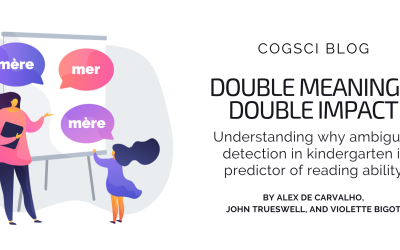I have just received the revisions of a colleague on my PhD dissertation, and among all her insightful remarks, one in particular struck me.
She wrote that the first person singular pronoun I is very frequent in my text, and suggested that I used more passive or impersonal constructions. My colleague is a German native speaker who speaks French and English perfectly. Yet on a day-to-day basis, she works in a Franco-German environment.
Why do I give you so much background information? Being a French native speaker writing my thesis in English (see this article for the reasons of my choice), I have the intuition that I’m not using the pronoun I that much — but that it might look like I do, at least for French and German speakers. In other words, what if my colleague’s comment was typical for different perceptions of academic writing in an international context? Let me be more specific.
When I first began writing in English, using the first person singular was a challenge. While I am used to the authorial we (plural first-person pronoun nous) in French and to impersonal constructions in German, I have been told very soon that I should avoid both in English — and so did I. I forced myself to say that I argue, I show and I observe, although I must admit that I still feel safer saying that it has been argued, shown, and observed. Trying to use more I-constructions — or at least to balance impersonal constructions with more personal ones — I was aiming at writing more native-like and thought I was showing adaptation to the current academic standards in my field, in which the preference is to make use of the active voice¹.
I had even considered writing a preliminary footnote on why I was using the personal pronoun I in my PhD thesis, but it soon felt like I would put too much emphasis on a pattern that would otherwise remain unnoticed. Indeed, no native speaker of English has expressed a similar concern, which does not necessarily mean that I am always using I adequately, but at least that it remains relatively unmarked in most of the cases. Moreover, after carefully looking for instances of I in my chapter, I found that I don’t really use the pronoun I often, and when I do, it is primarily in sections where I explain my methodology (how I proceeded and made specific choices). Yet my colleague’s comment has suddenly reminded how awkward I felt when I first spoke in the first person singular in my thesis. And made me realize that what I have interpreted as a way to comply with academic norms might be perceived as a declaration of self-confidence.
Although I am writing my PhD in English, it will not be read only by native speakers of English, but, rather, by scholars who use English passively (because they read it) or actively (because they read and write it), yet apply — probably unconsciously — their local, cultural expectations. As Istvan Kecskes argues, when speakers of different languages use English as a lingua franca, they bring prior knowledge based on how meaning is lexically encoded and conceptualized in other languages into the interaction. By doing so, “[t]hey create an interculture, which belongs to none of them but emerges in the course of conversation” (Kecskes 2014, p. 15).
I see my colleague’s comment as one of these examples of interculture, where the cultural norms prevalent in French and German academic writing are transferred (or merged?) to the target language, English as a lingua franca. And I indistinctly feel that my colleague might have invited me to use the personal pronoun I less for the ‘wrong’ reasons, that is to avoid appearing too assured.
In her paper “The Relativity of Linguistic Strategies: Rethinking Power and Solidarity in Gender and Dominance” (1993), Deborah Tannen highlights that “the ‘true’ intention or motive of any utterance cannot be determined from examination of linguistic form alone” (1993, p. 166). Her argument is that the same linguistic strategies can be interpreted as a sign of power or solidarity, or both, depending on the local context of the utterance and on the speakers themselves. I find this observation particularly illuminating in this case. The same linguistic strategy — the use of I — was only meant, to me, to “sound (more) English”. For my colleague, on the other hand, it probably signaled high involvement paired with a high degree of certainty. Maybe it even sounded so assured that she felt I was too self-confident (for a PhD student?).
A few weeks ago, I was writing to a friend of mine that I was progressively finding my voice. Actually, I wrote:
❝ J’ai l’impression de peu à peu trouver ma voix / voie.
Playing with the homophony of the words voix (voice, but also, in other contexts, vote) and voie (path, direction) in French, I was trying to express that writing helped me figuring out my arguments, or, in other words, that the how (finding my writing style) had direct consequences on the what (knowing what I’m trying to say). The writing process per se certainly has to do with this “revelation”, but in light of the above, I am tempted to say that writing in English and consequently writing in the first person singular might have shaped my thinking more than I would have expected.
This blog post is entitled “Finding Your Voice”. In French, I would have probably said “Trouver sa voix/voie”; in German “Seine Stimme finden”. Although “Finding One’s Voice” would have been possible in English, too, it felt more natural to use the generic you. You (!) might think this does not make a real difference, but from the very beginning, you are with me. In “Finding Your Voice”, you is self-referential (i.e. I, the speaker, am included in this you); yet you share this experience more closely (and I, conversely, distance myself a bit from it…). There is an empathy effect (Gast, Deringer, Haas & Rudolf 2015). Maybe you even identify with me; you think “Oh, I felt the same…!”. Maybe not. In any case, the use of you cognitively activates different representations, associations and connotations — whether you want it or not.
Just like the I of my thesis. With or without a footnote, writing in the first person singular reveals as much on me as on my readers. And that’s precisely why I love international settings — and why I love linguistics.
1. In English academic writing, too, there are still debates on whether the I is appropriate or not. Yet it seems — from what I have read — that the I is becoming more and more common and recommended, especially because it improves clarity (no vague constructions, who did what is made clear). I would not say that this is a rule, though, and I would also not say that I use I a lot. In fact, I usually limit it to parts of my thesis where I describe my methodology or my difficulties.
This blog post has been initially published on 01/05/2018, and slightly revised for the purpose of a repost on the blog of the Cognitive Science Society on 22/03/2022.
References
Gast, Volker, Lisa Deringer, Florian Haas & Olga Rudolf. 2015. Impersonal uses of the second person singular: A pragmatic analysis of generalization and empathy effects. Journal of Pragmatics 88. 148–162. doi:10.1016/j.pragma.2014.12.009.
Kecskes, Istvan. 2014. Intercultural Pragmatics. New York: Oxford University Press.
Tannen, Deborah. 1993. The Relativity of Linguistic Strategies: Rethinking Power and Solidarity in Gender and Dominance. In Deborah Tannen (ed.), Gender and Conversational Interaction, 165–188. Oxford: Oxford University Press.




